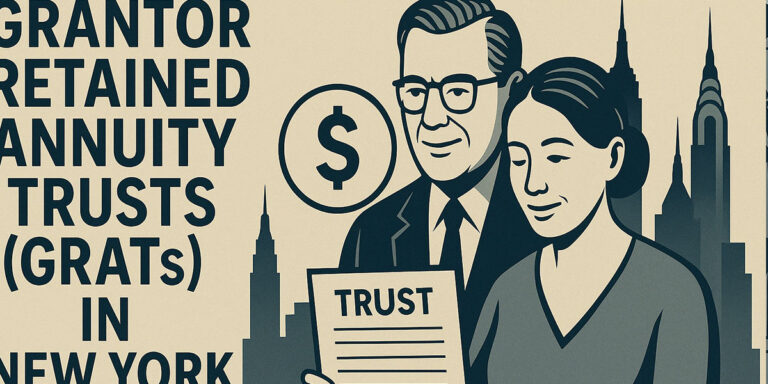
Grantor Retained Annuity Trusts (GRATs) in New York
Grantor Retained Annuity Trusts (GRATs) in New York: A Sophisticated Gifting Technique for Estate Tax Reduction in 2025 For high-net-worth individuals in New York, minimizing


Home » intestate distribution NYC

Grantor Retained Annuity Trusts (GRATs) in New York: A Sophisticated Gifting Technique for Estate Tax Reduction in 2025 For high-net-worth individuals in New York, minimizing

Qualified Personal Residence Trusts (QPRTs) in New York: Transferring Your Home Tax-Free and Planning for the Future (2025) For many New Yorkers, their home represents

Using Irrevocable Life Insurance Trusts (ILITs) in New York for Estate Tax Reduction: A Guide for 2025 Estate tax can significantly diminish the amount of

Estate Planning for Non-Citizens Residing in New York: Securing Your Assets and Protecting Your Family in 2025 As a non-citizen residing in New York, estate

The Impact of Divorce on Your Estate Plan in New York: Protecting Your Assets and Securing Your Future Divorce is a significant life event that

Avoiding Family Conflicts During Estate Administration in New York: Strategies for Harmony and Fair Resolution The loss of a loved one is an emotionally challenging

The Importance of Proper Witnessing and Notarization of Estate Planning Documents in New York: Ensuring Validity and Preventing Challenges Creating a comprehensive estate plan involves

DIY Estate Planning vs. Hiring an Attorney in New York (2025): Weighing the Pros and Cons to Protect Your Future With the rise of online

Common Estate Planning Myths Debunked in New York (2025): Separating Fact from Fiction to Protect Your Legacy Estate planning is often shrouded in misconceptions and

The Role of the Executor in New York Estate Administration: A Comprehensive Guide When a loved one passes away in New York, the process of

Estate Planning Tips for Your Blended Family in New York: Ensuring Harmony and Protecting Everyone’s Future Estate planning can be complex under any circumstances, but

Ethical Considerations in Estate Planning for New York Attorneys: Upholding Integrity and Serving Clients’ Best Interests Estate planning involves deeply personal and sensitive matters, requiring

Estate Planning for Same-Sex Couples in New York: Ensuring Legal Protections and Honoring Your Relationship With the advent of marriage equality, same-sex couples in New

New York Trust & Estates Legacy Lawyers: Securing Your Family’s Future for Generations Planning for the future involves more than just accumulating wealth; it’s about

Safeguarding Your Legacy: Who Should Keep Your Last Will and Testament in New York? Your last will and testament indicate how you want the assets

Estate Planning for Single Individuals in New York: Protecting Your Assets and Ensuring Your Wishes Are Honored While estate planning is often associated with married

Estate Planning for Digital Assets in New York: Managing Your Online Legacy In today’s increasingly digital world, our lives are intertwined with online accounts, social

Expert’s Guide: Estate Planning in New York – Secure Your Future Welcome to Morgan Legal Group P.C., your dedicated legal resource for estate planning in

Updating Your Estate Plan in New York: A Regular Check-Up for Your Legacy Creating an estate plan is a significant step towards protecting your assets

Is Life Distracting You from Seeing an Estate Planning Attorney in NYC? Reclaim Your Future Today Life in New York City moves at a relentless

Finding the Right Estate Planning Attorney Near You in the 10025 ZIP Code: Securing Your Future Planning for the future involves many important considerations, and

Finding a Last Will Lawyer in Staten Island, New York: Protecting Your Family’s Future Creating a last will and testament is one of the most

Finding the Right Will Lawyer in Queens: Protecting Your Legacy and Ensuring Peace of Mind Creating a will is one of the most important steps

Guardianship for Minor Children in New York: Protecting Their Future and Ensuring Their Well-being As a parent, ensuring the safety and well-being of your children

Estate Tax Planning in New York: Minimizing Tax Burdens and Preserving Your Legacy Estate tax can significantly impact the amount of wealth your heirs ultimately

Reverse Mortgages in New York: A Comprehensive Guide to Understanding the Benefits, Risks, and Impact on Estate Planning A reverse mortgage is a loan available

Probate Avoidance Strategies in New York: Minimizing Court Involvement and Streamlining Estate Administration Probate, the legal process of validating a will and administering an estate,

Healthcare Proxies and Living Wills in New York: Making Your Wishes Known and Ensuring Respect for Your Healthcare Decisions Planning for your future encompasses many

Powers of Attorney in New York: Planning for Incapacity and Protecting Your Future Life is unpredictable, and planning for the unexpected is a responsible and

Hospice Care and Estate Planning: Why You Need an Attorney in New York When facing a terminal illness, making the decision to enter hospice care
Ⓒ 2025 - All Rights Are Reserved | Privacy Policy | Estate Planning Attorney NYC | Sitemap